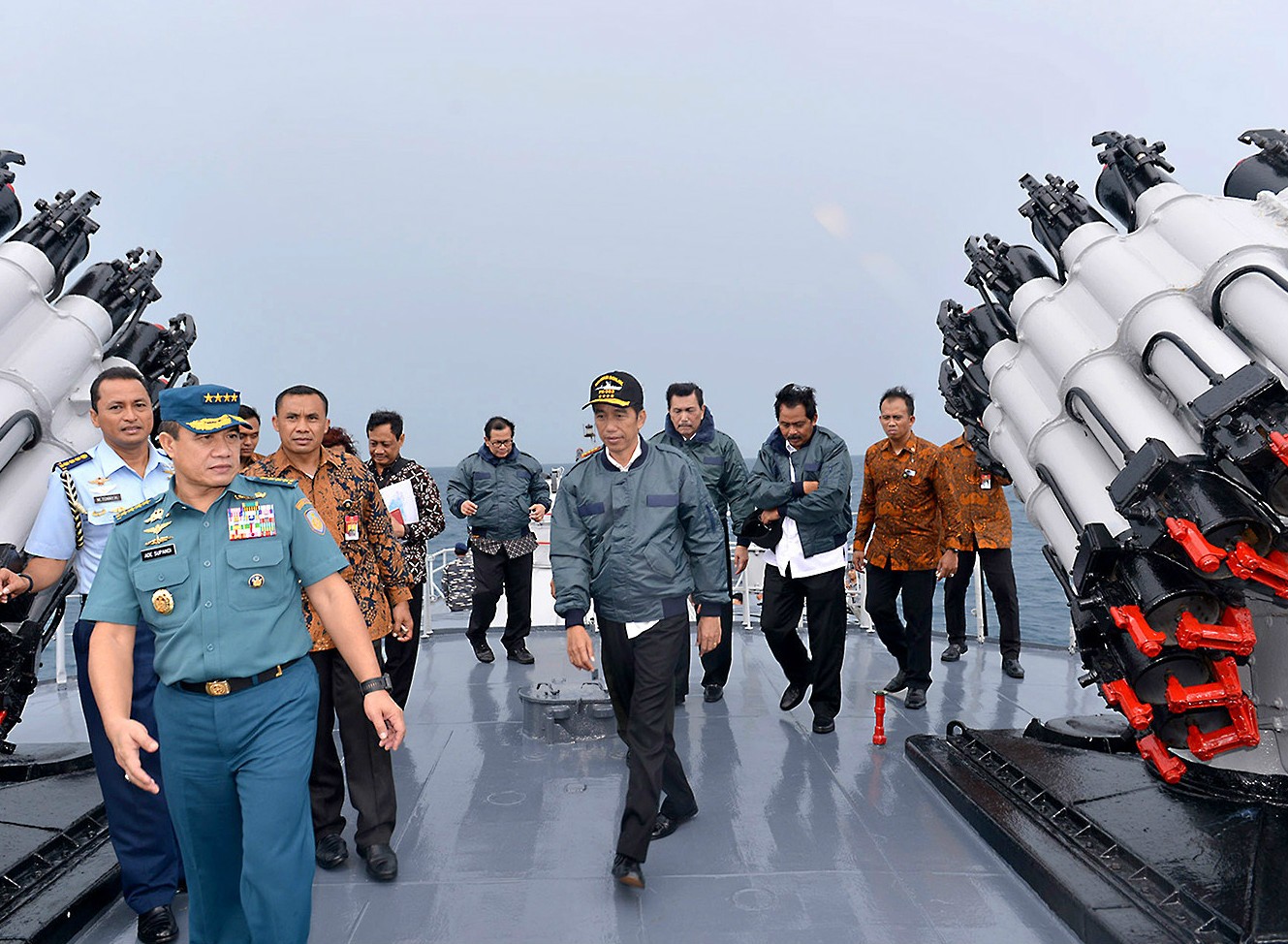Popular Reads
Top Results
Can't find what you're looking for?
View all search resultsPopular Reads
Top Results
Can't find what you're looking for?
View all search resultsIndonesia 'speaks Chinese' in South China Sea
Some scholars say Indonesia should consider abandoning its non-claimant stance and adopt a staunch and unambiguous measure in dealing with infringements of its waters. Others have suggested Indonesia’s “see no China” policy is a part of Jakarta’s grand strategy to increase its leverage against two rival superpowers, namely China and the US in its favor.
Change text size
Gift Premium Articles
to Anyone
T
his year there have been three spats involving Chinese fishing vessels assisted by China’s coast guard in Indonesia’s exclusive economic zone (EEZ) of Natuna Islands. Apparently, China’s nine-dash line in the South China Sea includes parts of Indonesia’s EEZ, which Beijing considers as its “traditional fishing grounds.”
To reassert Indonesia’s sovereignty over the Natuna Islands and the nation’s sovereign maritime rights in the islands’ adjacent waters, President Joko “Jokowi” Widodo sailed to the Natuna Islands on June 23.
One day before Jokowi’s visit, Foreign Minister Retno LP Marsudi rejected China’s stance that the two countries have overlapping claims over the waters around the islands. She made it clear that Indonesia’s maritime claim is consistent with international law and reiterated its stance as a non-claimant in the South China Sea disputes and therefore denies any claim of overlapping maritime rights with China.
This has been Indonesia’s long-standing position in the South China Sea.
Some scholars say Indonesia should consider abandoning its non-claimant stance and adopt a staunch and unambiguous measure in dealing with infringements of its waters.
Others have suggested Indonesia’s “see no China” policy is a part of Jakarta’s grand strategy to increase its leverage against two rival superpowers, namely China and the US in its favor.
However, Indonesia need not depart from its long-standing stance in the South China Sea. Let us examine Jakarta’s rejection of Beijing’s assertion of overlapping maritime rights over the Natuna waters from the perspective of China’s behavior in the South China Sea.
In a nutshell, Jakarta’s attitude in denying China’s maritime claim in the Natuna waters somewhat resembles Beijing’s attitude toward Vietnam in the Paracel (Xisha or Hoang Sa) Islands. In 1974 China — which perceives the Paracel Islands as its territory since ancient times — took them by force from the Republic of Vietnam (South Vietnam) and exerts full control over the islands until today.
The Socialist Republic of Vietnam (Vietnam after reunification) still asserts its claim over the Paracel Islands, despite China’s continuous rejection of any dispute with Vietnam. Beijing has maintained a denial strategy in the Paracel Islands in many events.
First, during the negotiation of the Declaration on the Conduct of Parties in the South China Sea in 2002, China objected to the special reference to the Paracel Islands since it firmly states that the islands are undisputed.
This move suggests Beijing considers the features in the South China Sea that have been occupied by China undisputed — while those which are unoccupied or occupied by others are disputed. Its Foreign Ministry also defended China’s operation of its oil rig near the Paracels Islands in 2014 by asserting that the activities were conducted in “waters under the undisputed jurisdiction of China”.
Regarding China’s recent military activities in Yongxing Island, which are part of the Paracels, Beijing also stated that the “Xisha Islands are undisputed Chinese territory”.
Even though Vietnam clearly disputes ownership of the Paracels, Beijing still maintains its stance by consistently denying Hanoi’s claim. Correspondingly, Jakarta disregards Beijing’s claim that some waters near the Natuna Islands are subject to overlapping claims. The denial strategy is meant to undermine the claim by the rival claimant and prevent it even from appearing on the surface.
By rejecting China’s claim of overlapping maritime interests, Jakarta is saying that Indonesia and China are not standing on equal footing on the Natuna waters. Jakarta’s claim over Natuna waters is guaranteed by international law, whereas Beijing’s is based on its unilateral claim.
Indonesia’s stance on the South China Sea issue may not be well understood by some, but in the Natuna waters, Indonesia is using the same language as China in the Paracels, with different standpoints.
The former has the UN Convention on the Law of the Sea as its foundation; the latter relies on history and occupation since 1974.
By using the same language as China, Indonesia believes that China understands that Jakarta has the same determination as Beijing in protecting its sovereign rights. With the backing of the rule of law, Jakarta is speaking “Chinese” to Beijing in the Natuna waters.
Imagine if Indonesia acknowledged the so-called “overlapping maritime rights” with China in the Natuna waters, the nine-dash line claim would be boosted and international law would be seriously challenged.
The reiteration of Jakarta as the nonclaimant state with no dispute with China is the best South China Sea policy.
***
The writer is researching China’s recent behavior and strategy in the South China Sea for his PhD at the Department of Government and International Relations, School of Arts and Social Sciences, the University of Sydney.
---------------
We are looking for information, opinions, and in-depth analysis from experts or scholars in a variety of fields. We choose articles based on facts or opinions about general news, as well as quality analysis and commentary about Indonesia or international events. Send your piece to community@jakpost.com.









